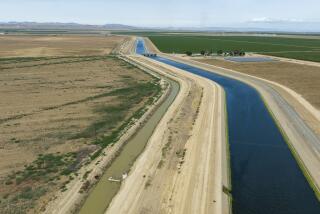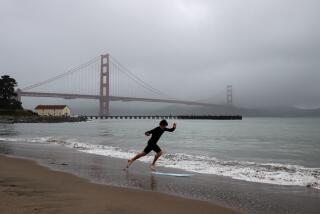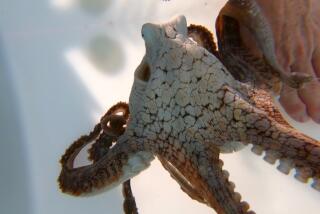Court Tells U.S.--Cut Japan Fish Quota Over Whaling
- Share via
WASHINGTON — In a significant victory for environmentalists, a federal judge Tuesday ordered the Reagan Administration to cut in half Japan’s quota of fish caught in U.S. waters because Japan refuses to stop killing sperm whales in the North Pacific.
U.S. District Judge Charles R. Richey, in a 28-page decision, cited federal laws that require the secretaries of commerce and state to apply economic sanctions against nations that disobey an international ban on killing sperm whales.
In enacting the laws, Congress “wanted to send out a clear message to the world that the United States was committed to being in the vanguard of the fight to preserve the whale,” the judge wrote.
The ruling stems from a suit filed last November by 12 environmental groups and one individual after an agreement was reached between the Commerce Department and Japan on the acrimonious issue of whaling. Under the arrangement, Japan agreed to stop sperm whaling at the end of the 1987 season but would be allowed to kill up to 1,200 sperm whales between 1984 and 1987 without encountering sanctions by the United States.
Environmentalists argued that the agreement flouted an existing International Whaling Commission moratorium on the killing of sperm whales and that it ignored U.S. law requiring the sanctions against nations that fail to comply with the moratorium.
Richey agreed, ruling that Commerce Secretary Malcolm Baldrige “had a clear and non-discretionary duty” to levy sanctions against the Japanese. The Reagan Administration immediately announced that it will appeal the ruling and ask for a stay on the judge’s order.
At the Justice Department, Donald Carr, chief of the Wildlife and Marine Resources Division, called the decision an “undue intrusion into foreign policy-making discretion” that “misses the forest for the trees.” He asserted that the Japanese, who had previously balked at international efforts to end whaling, had agreed to get out of sperm whaling altogether at the end of 1987 and that the whales they kill in the meantime would not endanger the species.
Environmentalists reacted swiftly to the decision. Craig van Note, executive vice president of Monitor, a consortium of 30 animal welfare groups, called it a “landmark ruling” and added that it has inspired him and others to “seriously contemplate” trying to use U.S. statutes to file suits against those who kill and trade other endangered animals. He mentioned specifically Mexicans who trade wild birds and Africans who kill elephants for their ivory tusks.
Hails ‘First Step’
Mark Cheater, wildlife legislative director for Greenpeace U.S.A., called the victory a “first step” in a battle against Japan over whaling and said environmentalists will step up an effort to boycott Japan Air Lines.
Industry experts estimate that the Japanese would lose anywhere from $140 million to $250 million worth of fish a year if the order is carried out. Japan had been allowed to take 1 million metric tons of fish each year from U.S. waters, an amount cut under Richey’s order to 500,000 tons.
When the Japanese weigh the projected loss against an estimated $50-million-a-year profit from the whaling industry, “I would hope they would see this is the end of the road” for whaling, said William D. Rogers, a former undersecretary of state who is an attorney for the environmentalists.
But whether the Japanese will comply with the ruling is in question. A Japanese Embassy spokesman declined to comment on the matter, referring inquiries to the Japan Whaling Assn. in New York.
Alan Macnow, consultant to the association, expressed disappointment in the ruling and said he could not “hazard a guess” on whether Japan would stop whaling. He added that they “are angry about their treatment” by the International Whaling Commission.
More to Read
Sign up for Essential California
The most important California stories and recommendations in your inbox every morning.
You may occasionally receive promotional content from the Los Angeles Times.










